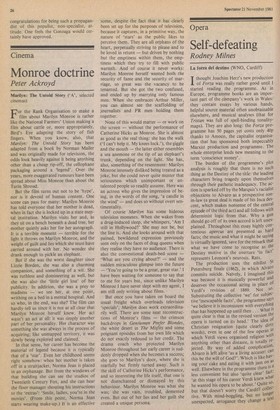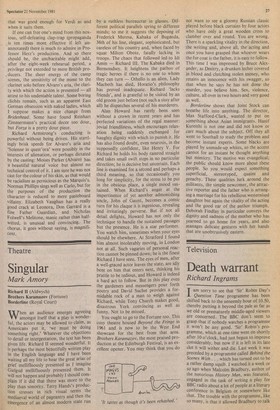Opera
Self-defeating
Rodney Milnes
La forza del destino (WNO, Cardiff) T thought Joachim Herz's new production 1 of Forza was really rather good until I started reading the programme. As in Europe, programme books are an important part of the company's work in Wales: they contain essays by various hands, helpful source material often unobtainable elsewhere, and musical analyses (that for Tristan was full of spell-binding tonalitymaps). They are also long: the Forza pro gramme has 50 pages yet costs only 40p thanks to Amoco, the capitalist organisation that has sponsored both impeccably Marxist production and programme. The whole enterprise lends new meaning to the term 'conscience money'.
The burden of the programme's plot analysis is roughly that there is no such thing as the Destiny of the title: the leading characters bring tragedy upon themselves through their pathetic inadequacy. The action is sparked off by the Marquis's racialist objections to Alvaro as a prospective sonin-law (a great deal is made of his Inca descent, which makes nonsense of the central episode of the third act) and all follows with determinist logic from that. Why a gun should go off of its own accord is left unexplained. Throughout this essay highly contentious apercus are presented as hard facts; the music and what it might be saying is virtually ignored, save for the remark that what we have come to recognise as the Destiny motive in the overture 'in fact represents Leonora's neurosis. Rats. The production uses the nihilist St Petersburg finale (1862), in which Alvaro commits suicide. Naively, I imagined this was because it is musically powerful and deserves the occasional airing in place of Verdi's revision of 1869. Not so. Substituting the collective 'we' for subjective 'inescapable facts', the programme says 'we believe it is inconsistent with everything that has happened up until then . . . What Is quite clear is that in the revised version the opera is turned on its head.' The idea. of Christian resignation (quite clearly dir!Y words), even in one of the few operas.in which Verdi views organised religion With anything other than distaste, is totally. rejected. By way of added complication, Alvaro is left alive 'as a living accuser: can this be the will of God?'. Which is like having your cake and eating it with jam on as well. Elsewhere in the programme there is a. less convenient but also 'quite clear' fact. 'at this stage of his career Verdi knew what he wanted his opera to be about.' Quite so, but that doesn't worry the Cardiff collective. With mind-boggling, but no longer unexpected, arrogance they change a tegt.
that was good enough for Verdi as and when it suits them.
If one can free one's mind from this noxious, self-defeating clap-trap (propaganda is ten times more effective if left unannotated) there is much to admire in Professor Herz's production. And so there should be, the uncharitable might add, after the eight-week rehearsal period, a privilege not extended to mere British pro. ducers. The sheer energy of the camp scenes, the sensitivity of the mime to the
clarinet solo before Alvaro's aria, the clarity with which the action is presented — all attest to his undeniable talent. Some boring cliches remain, such as an apparent East German obsession with naked ladies, which I suppose makes a nice change from Brideshead. Some have found Reinhart Zimmermann's practical decor too dour, but Forza is a pretty dour piece.
Richard Armstrong's conducting is powerful without being driven. His startlingly brisk speeds for Alvaro's aria and `Solenne in quest 'ora' were possibly in the interests of alienation, or perhaps dictated by the casting: Moises Parker (Alvaro) has a beautiful natural voice but almost no technical control of it. I am sure he was not cast for the colour of his skin, as that would be racialism as pernicious as the Marquis's. Norman Phillips sings well as Carlo, but for the purposes of the production the character is reduced to mere pasteboard villainy. Elizabeth Vaughan has a really good crack at Leonora, Don Garrard is a fine Father Guardian, and Nicholas Folwell's Melitone, manic rather than halfwitted, is unusual and convincing. The chorus, it goes without saying, is magnificent.











































 Previous page
Previous page